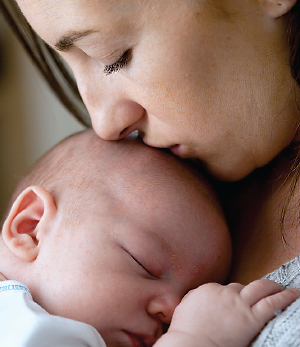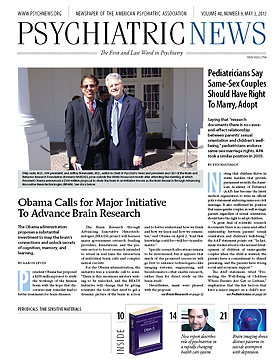Depression is a frequent complication of childbearing, but how useful is screening new mothers for depression? And what steps should be taken on the basis of such screening?
Those are questions Katherine Wisner, M.D., and her colleagues sought to answer when they recently evaluated 10,000 mothers at an urban obstetrical hospital using the Edinburgh Postnatal Depression Scale (EPDS).
In their study, published March 13 in JAMA Psychiatry, the researchers said that this is the largest American population to undergo screening with the EPDS. Wisner is director of the Northwestern University Asher Center for the Study and Treatment of Depressive Disorders, as well as the Norman and Helen Asher Professor of Psychiatry and Behavioral Sciences and a professor of obstetrics and gynecology at Northwestern University Feinberg School of Medicine in Chicago. Wisner was formerly a professor of psychiatry, obstetrics, gynecology, and reproductive sciences and epidemiology at the University of Pittsburgh School of Medicine and performed the research in this study there.
Of the postpartum women Wisner and her colleagues screened, 14 percent (1,396 mothers) had positive findings. Screen-positive women were more likely to be younger, African American, publicly insured, single, and less well educated.
More of the episodes began postpartum (40.1 percent), followed by those that began during pregnancy (33.4 percent) and before pregnancy (26.5 percent). In this population, 19.3 percent had thoughts about harming themselves; mothers with the highest intensity of self-harm ideation were identified with an EPDS score of 10 or higher. The most common primary diagnoses were unipolar depressive disorders (68.5 percent), and about two-thirds had comorbid anxiety disorders. The researchers noted that a striking number, 22.6 percent, had bipolar disorders and called for the development of strategies to differentiate women with bipolar from unipolar disorders. The overwhelming majority of those with unipolar disorders were identified as having major depressive disorder, a finding the researchers said was consistent with other epidemiological studies.
“In the U.S., the vast majority of postpartum women with depression are not identified or treated even though they are at higher risk for psychiatric disorders,” said Wisner in a press release announcing the study. “It’s a huge public-health problem. A woman’s mental health has a profound effect on fetal development as well as her child’s physical and emotional development.” She also lamented that many women do not understand what is happening to them, thinking they’re just stressed or that their feelings are “how having a baby is supposed to feel.”
Strengths of the study included the large heterogeneous population of non-treatment-seeking women and psychiatric diagnostic interviews with most of the women with positive screen results. The clinicians who were involved were highly trained to differentiate unipolar from bipolar depression, which may have accounted for the high rate of recognition of bipolar disorder among the participants.
Wisner and colleagues noted that intervention for the women in this study, care management vs. usual care for women with depressive disorder, is being analyzed and will be presented in a separate publication. The study was supported by a grant from the National Institute of Mental Health. ■

